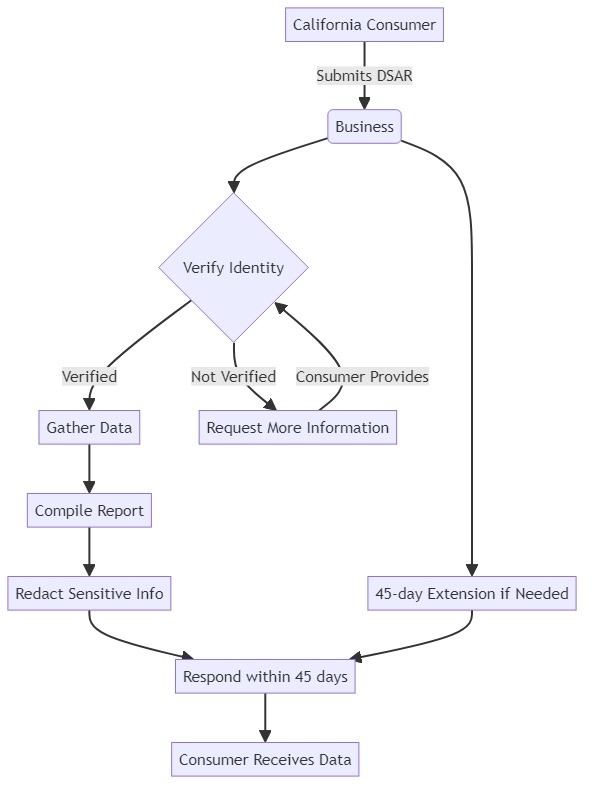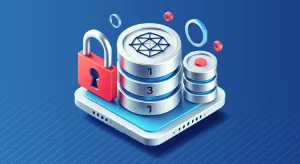
How to Comply with CCPA Right to Know and Data Subject Access Requests (DSAR)

The California Consumer Privacy Act has introduced significant changes to how businesses handle consumer data. One of the most important aspects of this law is the Right to Know provision. This article will explain the CCPA Right to Know for businesses and consumers. Also discussed will be how companies can ensure they are compliant with the rules.
What is the CCPA Right to Know?
The CCPA Right to Know lets California residents ask businesses for information on how they use their personal data. Consumers can ask companies about their personal data, why it was collected, and who it was shared with. A crucial step towards transparency in data handling practices.
For example, a shopper can ask an online store about the data they collect on shopping behavior. They can also ask how the store uses this data for marketing purposes. Additionally, they can inquire about whether the store shares this data with other companies.
Responding to CCPA DSARs
When a consumer exercises their Right to Know, they submit a Data Subject Access Request. Businesses must prepare to handle these requests efficiently and accurately. A CCPA DSAR requires companies to provide a detailed report of the consumer’s personal information within 45 days of receiving the request.

For instance, if a social media platform receives a DSAR, they might need to compile information about the user’s profile data, post history, and any data they’ve shared with advertisers or other third parties.
Verifying Consumer Identity
Before fulfilling a DSAR, businesses must verify the identity of the requester. This step is crucial to prevent unauthorized access to personal information. Companies can verify identities by asking for account details or using third-party services for verification.
A bank, for example, might ask a customer to provide their account number, the last four digits of their social security number, and answer security questions before processing their DSAR.
Providing Detailed Information
Businesses must provide comprehensive information about the personal data they’ve collected once they verify a consumer’s identity. This includes specifying what types of data they have, where they got it from, why they collected it, and who they’ve shared it with.
A fitness app, for instance, might need to disclose that they’ve collected data on a user’s workout routines, heart rate, and location. The app collects data for personalized fitness suggestions. The company also shares the data with a cloud storage provider for backup. They need to make it clear to users.
Handling Sensitive Information
When responding to a DSAR, businesses must be careful about how they handle sensitive information. Any data that could pose a security risk if exposed, such as full social security numbers or complete credit card details, should be redacted before being shared with the consumer.
Timely Responses to DSARs
The CCPA requires businesses to respond to DSARs within 45 days. Companies can extend the period by 45 days if needed, but they must notify the consumer within the first 45 days.
For example, if a large tech company receives a DSAR from a long-time user with extensive data history, they might need to inform the user that due to the volume of data, they’ll require an additional 45 days to compile all the requested information.
Challenges in CCPA Right to Know Compliance
Complying with the CCPA Right to Know provision can be challenging for businesses. One of the main difficulties is data mapping – understanding where all consumer data resides within the company’s systems. This can be particularly complex for large organizations with multiple data storage locations and types.
Another challenge is managing a high volume of DSARs. Some businesses, especially those with a large California customer base, might receive numerous requests, straining their resources.
For example, a well-known online shopping website may get many data subject access requests in one month. This takes a lot of time and resources to handle each request correctly and promptly.
Best Practices for CCPA Compliance
To effectively comply with the CCPA Right to Know provision, businesses should consider implementing several best practices. Automating the DSAR process can greatly improve efficiency. This might involve using software that can automatically gather and compile requested information from various data sources.
Centralizing DSAR management is another effective strategy. Businesses should assign a specific team or person to handle all requests for DSARs. This will help ensure consistency in responding to these requests and track compliance efforts.
Employee training is also crucial. All employees who handle personal data or respond to DSARs need to be aware of the CCPA rules. They should also know the company’s procedures for managing these requests.
Regularly monitoring DSAR metrics can help businesses identify areas for improvement in their compliance processes. This could involve monitoring how quickly requests are answered, how many requests are made, and any common problems that come up.
The Importance of Ongoing Compliance
CCPA compliance, particularly with the Right to Know provision, is not a one-time effort. As businesses evolve and data handling practices change, companies must continually review and update their compliance strategies.
For example, if a company introduces a new product or service that collects additional types of consumer data, they need to update their data mapping and DSAR response processes to include this new information.
Conclusion
The CCPA Right to Know provision represents a significant shift towards greater transparency and consumer control over personal data. Compliance can be tough, but it’s a chance for businesses to show customers they value data privacy and build trust.
Businesses can show they handle consumer data responsibly by following the CCPA. They can do this by having strong processes for handling DSARs, accurate data maps, and staying updated on regulations. This approach can ultimately lead to stronger customer relationships and a competitive advantage in an increasingly privacy-conscious marketplace.
